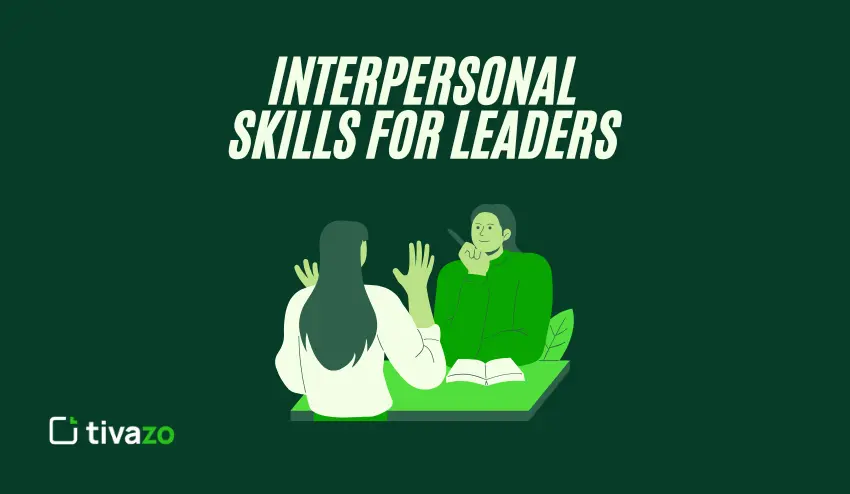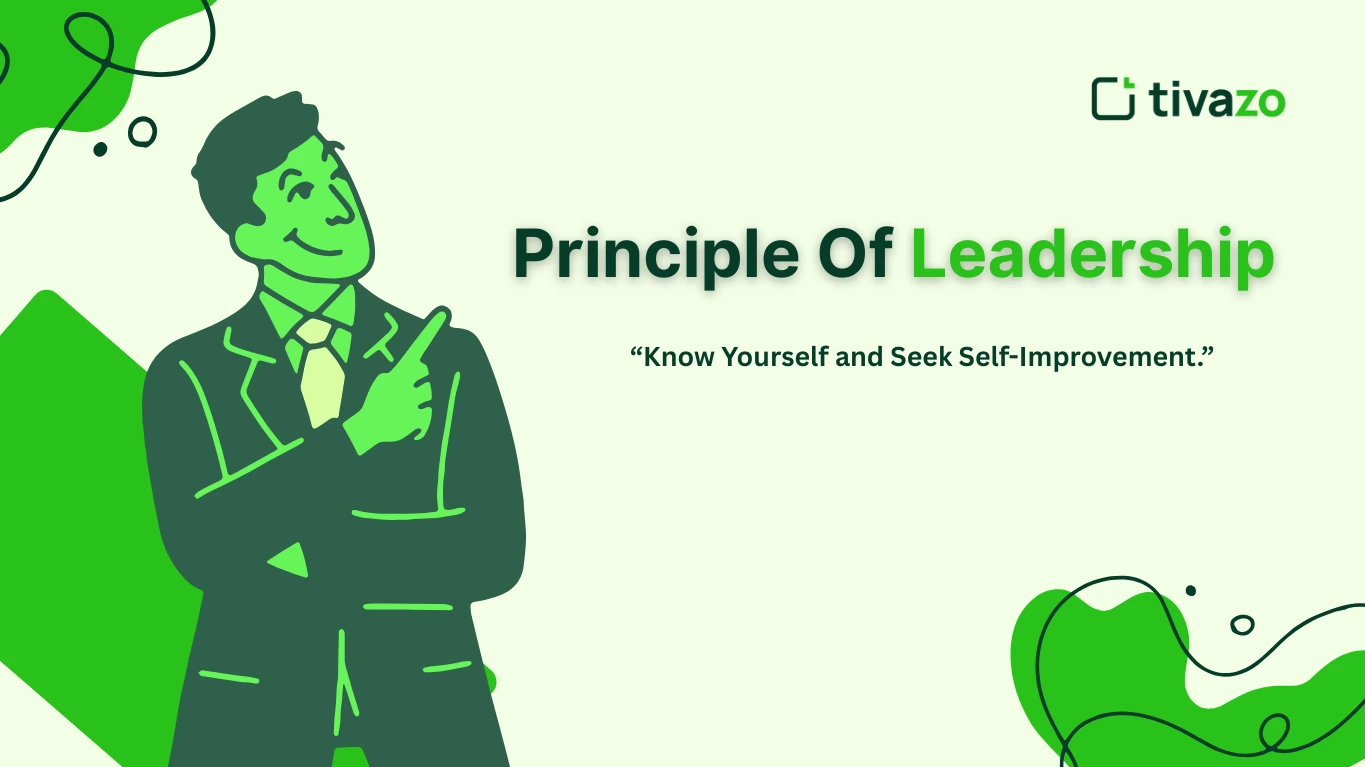Think about the best leader you have ever worked with. It is very unlikely that it was only their technical expertise or vision that was remarkable. It was the way they made people feel, heard, valued, and motivated. That skill is not job-based. It is a result of good interpersonal skills in leaders.
People-oriented skills are called interpersonal skills and define the way leaders communicate, engage in conflict resolution, and build trust. They can make even the most intelligent leader have a hard time gaining respect and maintaining a team. Leaders can be more effective in motivating loyalty, fostering cooperation, and leading their teams through difficult situations with them.
This guide simplifies all you should know about interpersonal skills for leaders. You will find out what these skills are, why they are important, and a 7-step model to reinforce them. We will also discuss real-life examples, everyday challenges, and how to continue to improve in practical ways so that you can lead with confidence and make a difference.
What Are Interpersonal Skills for Leaders?
Interpersonal leadership skills are those skills that enable the leader to relate, communicate and cooperate with other people. These are not technical and task-based skills. They are more concerned with the relationship between leaders and people, be it inspiring a team, solving a conflict, or establishing trust throughout the company.
Communication, empathy, active listening, emotional intelligence, and relationship management are all interpersonal skills at the core. Strong interpersonal leaders are able to adjust their style to various circumstances, and they are therefore better placed to lead diverse teams.
Interpersonal skills for leaders are not just about being nice or being friendly. They are about building an environment of transparency and respect in which individuals are encouraged to do their best work. Listening, providing constructive feedback and being aware of team dynamics will make a significantly more impressive leader compared to a leader who solely uses authority.
The 7-Step Framework to Master Interpersonal Skills for Leaders
Learning interpersonal skills as a leader is not a lucky thing, but a process. The 7-step model below gives you a workable map to improve interpersonal skills for leaders and empower your team to be more effective.
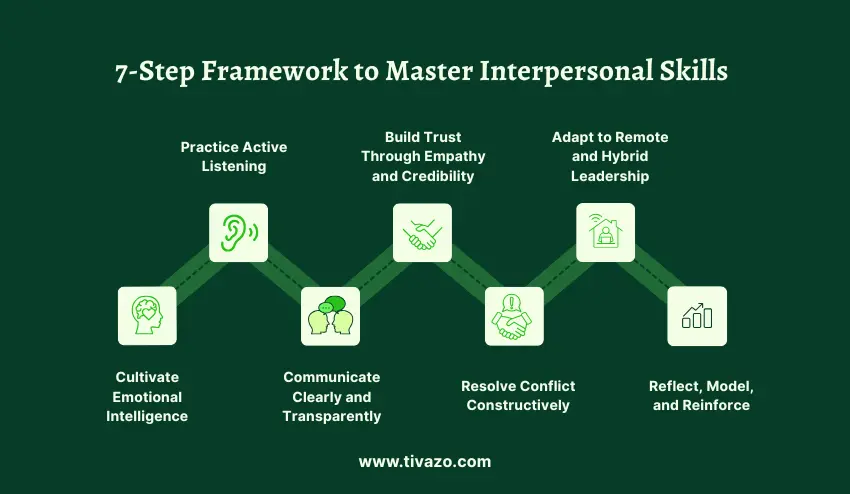
1. Cultivate Emotional Intelligence (EI)
Emotional intelligence refers to the skill of being aware of your feelings and those of other people, as well as being able to control them. High EI leaders are able to remain composed when under pressure, to empathise with their staff, and make superior decisions.
How to improve:
- Be self-aware by thinking about everyday experiences.
- Note the reactions of the team members toward your way of communicating.
- Change how you approach people according to their emotional signs.
2. Practice Active Listening
Active listening is to listen attentively, to understand, and respond intelligently to what the team is saying. It is respectful and trusting.
Practical tips:
- Rephrase what team members say so as to understand.
- Use open-ended questions to promote conversation.
- Look straight and have proper body language.
3. Communicate Clearly and Transparently
Effective communication eliminates the chances of confusion and helps everyone understand what is expected. Openness creates confidence and trust.
Actionable steps:
- Make messages short and to the point.
- Make use of structured updates: what, why, and next steps.
- Follow up to ensure understanding.
4. Build Trust Through Empathy and Credibility
Good leadership is based on trust. Exercising empathy and reliability helps to improve your credibility.
Ways to build trust:
- Be a promise keeper and promise giver.
- Demonstrate a real interest in the problems of team members.
- Reward the achievements and give positive feedback.
5. Resolve Conflict Constructively
Any team has to have conflict. Leaders who possess excellent interpersonal skills can handle the disagreements without destroying relationships.
Conflict resolution steps:
- Accept the problem and be impartial.
- Book separate meetings so as not to face open confrontations.
- Focus on solutions, not blame.
- Follow up to make sure it has been resolved and learned.
6. Adapt to Remote and Hybrid Leadership
It takes new interpersonal skills for leaders to lead teams virtually. Long-distance communication is prone to misunderstanding.
Tips for virtual leadership:
- Have weekly one-on-one check-ins.
- Keep in touch with casual conversations.
- Write down and clarify.
7. Reflect, Model, and Reinforce
Managers create the mood of a team. Looking back at your encounters and exemplifying good manners is likely to prompt others to do.
Practical actions:
- Review your communication and interactions at the end of every week.
- Examples of how you would like your team to behave.
- Reward and encourage good interpersonal behaviours in others.
Benefits of Interpersonal Skills for Leaders
Good interpersonal leadership competencies leave a permanent impression on teams and organizations. The three most important benefits are outlined as follows:
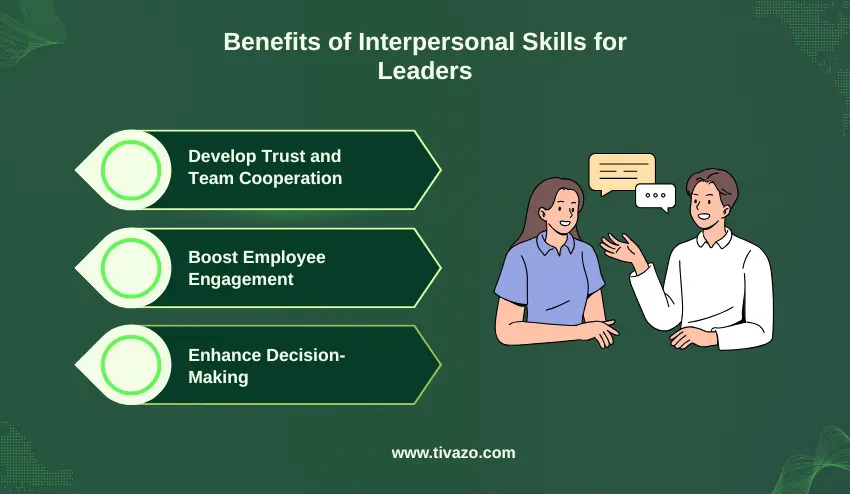
1. Develop Trust and Team Cooperation
Leaders who excel in interpersonal skills as leaders are communicative, active listeners, and empathetic. These practices build credibility and trust, and employees will feel secure as they execute their orders.
Conflicts within a team can be solved better and teamwork in projects can be improved by trust among team members towards their leader. Trust also leads to open communication, where team members feel comfortable sharing ideas, feedback and concerns, which makes the team more cohesive and high performing.
2. Boost Employee Engagement and Productivity
Strong interpersonal skills for leaders also imply that leaders who have this skill actively recognize achievements, offer constructive feedback, and support professional development. Employees become motivated and more involved in their job when they feel that they are appreciated and listened to.
Such interaction results in more output, higher quality deliverables and faster team achievement. Moreover, employee engagement minimizes employee turnover and allows organizations to retain the most talented employees.
3. Enhance Decision-Making and Organizational Culture
By knowing their team, leaders can also obtain an extensive variety of opinions, be knowledgeable about issues, and make superior decisions. Leaders also need strong interpersonal skills that would contribute to a positive organizational culture: a culture of respect, inclusion, and psychological safety. This organizational culture helps in attracting the best talent, retaining the high performers and providing employees with a comfortable environment to share ideas and innovate, which in the long term will result in organizational success.
Real-life Examples of Leaders Who Practice Interpersonal Skills
Understanding interpersonal skills for leaders is one thing, but seeing them in action makes the lessons clear. Here are some real-world examples of leaders who leveraged strong interpersonal skills for leaders to inspire teams and drive results.
Mary Barra – Building Trust Through Transparency
Mary Barra became the CEO of General Motors at a time when the company was going through a major crisis that involved vehicle recalls. She did not hide behind the carpet when communicating with employees, customers, and the masses and avoiding tough conversations. Her transparent approach built trust, demonstrating that strong interpersonal skills for leaders, like honesty and empathy, can stabilize teams and protect organizational reputation. This case study talks about it in a more detailed manner.
Sundar Pichai – Listening and Empathy
Google CEO Sundar Pichai is also a leader who listens to his staff and knows his staff. He builds a team spirit and makes employees feel valued since he seeks feedback and initiates a discussion. This example highlights the importance of interpersonal skills for leaders, particularly active listening and emotional intelligence.
Collaborative Leadership in Action
Organizations that seek high-quality collaborative teams nurture leaders who employ interpersonal skills for leaders. Some examples of interpersonal skills include: acknowledging contributions, managing interpersonal conflict, and adapting communication to the audience. Interestingly, the two most leveraged factors of the project manager who uses empathy and relationship management, factors to lead cross-functional teaming to support project complexity and change are empathy and relationship management.
The Main lessons Learnt
- Credibility comes through trust and transparency.
- Active listening produces interaction and cooperation.
- Compassion enhances decision-making and morale.
- Flexibility assists leaders in adapting to different teams and situations.
These examples illustrate that interpersonal skills for leaders are not abstract, they are practical tools that leaders can use every day to inspire and guide their teams.
Common Challenges Leaders Face With Interpersonal Skills
Even experienced leaders can struggle with interpersonal skills for leaders. The initial way of making them better is to identify them. The most common barriers are the following:
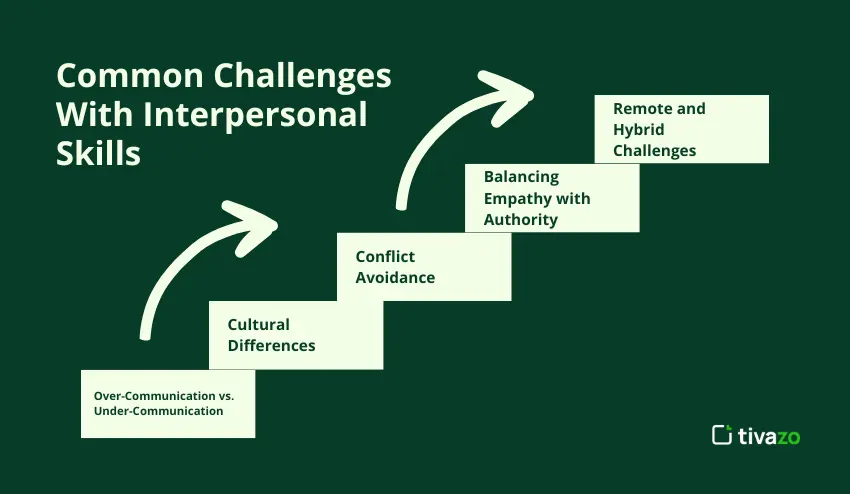
1. Over-Communication vs. Under-Communication
There are those leaders who talk a lot and overload their subjects, and those who talk very little, and thus confuse the staff. Striking a balance is an important aspect of good leadership. Over-communicating leads to the problem of excess information, and under-communicating leads to lack of understanding.
2. Cultural Differences
Different teams can communicate, use gestures, and provide feedback in very different ways. Leaders should be aware of the cultural features of a certain culture and adapt their interpersonal style to it. The misunderstanding of cultural norms can unintentionally offend the members of the team or reduce the efficiency of teamwork.
3. Conflict Avoidance
A lot of leaders do not prefer conflict resolution since they do not want to feel uncomfortable. This can facilitate issues to simmer and hurt team morale and productivity. The readiness to take the initiative to solve conflicts shows daringness, reinforces duty, and prevents the development of minor problems.
4. Balancing Empathy with Authority
The leaders should be persuasive without losing their sense or power. Too much frivolity will be seen as a form of frailty and too much caution will push the team away. This will be done by being respectful without losing trust and credibility.
5. Remote and Hybrid Challenges
Working with virtual teams as a leader poses communication obstacles, reduces social cues, and informal interactions, making interpersonal skills all the more crucial. Leaders must be creative in their quest to reach and establish team unity even in cases where the space is physical. Regular check-ins, video calls, and virtual team-building exercises can help to address this gap.
How to Improve Interpersonal Skills as a Leader
Even leaders with already good interpersonal skills for leaders can continue to develop. Continued development keeps you effective, supple when you change teams, and relating well to people. Leaders who consistently develop, hone and enhance their interpersonal skills for leaders are more likely to develop trust and encourage collaboration and engagement from team members.
1. Seek Feedback Regularly
Ask team members, peers, and mentors for an honest feedback regarding your communication, empathy, and leadership style. Positive feedback can be used to determine weaknesses and strengths. By acting on this input, you can enhance your interpersonal skills for leaders and become more effective in guiding your team.
2. Engage in Self-Reflection
Take time to look back at your interactions and choices. Think about what has worked, what could have been better, and how your behavior affects your team. Learning can be reinforced through journaling or taking notes of important lessons learnt after meetings.
3. Attend Training and Workshops
Structured learning opportunities can be created through leadership training, communication, conflict resolution, and emotional intelligence workshops and courses. These programs provide tools, models, and real-life situations to apply and practice interpersonal skills.
4. Watch and Learn through Role Models
Name a people skills leader that you like and see how he or she communicates, gives feedback, and resolves conflict. It can be fast-tracked by emulating their best practice with modifications to suit your style.
5. Be Proactive in Everyday Practice
Interpersonal skills develop through practice. Give your team active listening, positive feedback, sympathy, and appreciation. These small daily things. These daily things accumulate over time into a more serious leadership relationship with your team.
By dedicating to improve yourself as a leader you will have your interpersonal skills for leaders sharper, more relevant, and successful. In the long run, the effort will pay off into better teams, greater trust, and improvements in overall organizational performance.
Conclusion
Interpersonal skills for leaders are essential for building trust, motivating teams, and driving organizational success. Leaders who learn how to communicate, be empathic, active listeners, and conflict resolvers build stronger and more engaged teams.
These skills are acquired through conscious effort: you need to get feedback, consider your interactions, practice every day, and learn to act like you see role models. These will add over time and you will become a better and more respected leader.
Investing in your interpersonal skills for leaders isn’t optional, it’s a critical step toward.
